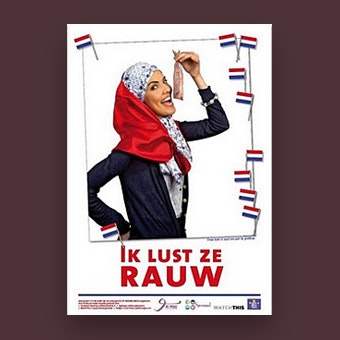Are Muslim Women “Really Dutch”?
By Hélène Irving

Almost every day I come across a spectrum of negative and damaging stories about Islam and Muslims in Europe. Currently the main stories tend to include images of burqa-clad women reinforcing once more the almost medieval idea that Muslim women are poor, defenseless creatures who need protection from themselves, their menfolk, and their religion.
My attention was grabbed recently by something refreshingly different. A Dutch women’s organization, Al Nisa, launched a campaign aimed at combating prejudice about Muslim women, and at the same time giving a human face to the social debate about Islam taking place in the Netherlands.
Entitled “Really Dutch” (Echt Nederlands), the posters use humor and traditional stereotypes about being Dutch to counter negative stereotypes about Muslim women.
One of the posters shows a Muslim woman in a Delft Blue headscarf about to swallow a herring, a traditional Dutch delicacy. The tagline for this poster: "I like them raw"!
In all four posters, the women portrayed are from a mixture of ethnic backgrounds and, importantly, not only are they not all shown to be wearing a headscarf, there is not one niqab or burqa in sight. The image of Muslim women presented by these posters is refreshing, more accurate, and very much needed if we are ever going to shake off the view of Muslim women that various politicians, media, and other opinion formers continuously throw our way.
The chair of Al Nisa, Leyla Çakir, explains: "We want to make it clear, in a humorous way, that we are Muslims but we're also Dutch. And we want to break down the negative prejudices about Muslim women: that we are oppressed; that we spend all our time indoors; that we have nothing to say.” She adds: "We are Dutch as well as Muslim, so sometimes we do like herring or liquorice or a slice of cheese."
Thankfully, efforts to counter negative stereotyping of Muslim women seem to be on the rise. Diversifying mainstream representation of Muslim women in Europe is one of the aims of the European Muslim Women of Influence List 2010, which is sponsored in part by the Open Society Institute.
The list is designed to recognize the achievements of Muslim women in a plethora of social arenas. In celebrating their success, the list aims to raise awareness of Muslim women’s contribution to European life, diversify the current representation of Muslim women in mainstream culture, and inspire accomplishment and success across Europe’s communities. Such initiatives are important in countering the harm done by the persistent portrayal of Muslim women as victims.
Perhaps raising awareness of European Muslim women and their achievements will only inspire more women of Muslim and minority communities to stand up and be recognized for the integral members of society they are.
I only hope that initiatives such as Al Nisa’s poster campaign and the European Muslim Women of Influence List continue to grow and encourage other like-minded initiatives. Until then, I urge you to take a look at those posters, to make a nomination, and to start making a difference not just for Muslim women but women of all backgrounds.
Until October 2014, Hélène Irving was a program coordinator for the Open Society At Home in Europe project.